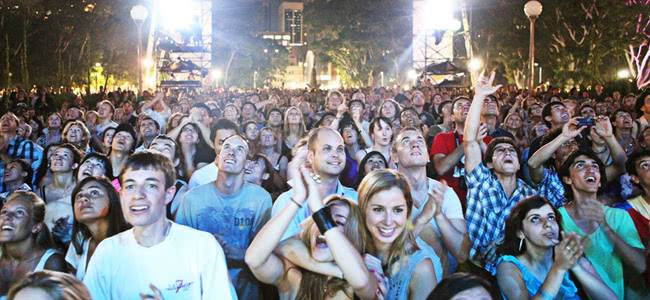The City of Sydney council are looking at ways to improve the live culture, of which music is a key part, in their city – and they’re asking for public submissions to aid in the process.
The Sydney Morning Herald recently ran a piece speaking with Rachel Healy, the executive manager of culture at the City of Sydney, about spearheading new initiatives to improve the attitudes of Sydneysiders towards their arts and performances, as well as practical plans to roll out a new cultural policy that aims to put Sydney back on the forefront as one of Australia’s cultural hubs.
“The cities that demonstrate they value culture and creativity are not necessarily cities that only invest in major cultural infrastructure,” Healy told the paper, relaying a recent visit to the Monterey Jazz Festival as an eye-opening experience.
“Programmers didn’t see their job as beginning or ending with programming Regina Spektor or Prince,” says HeaLy. “It was anticipating what their audiences might want to do before and after. You might have tickets to an 8pm show but you could turn up at 3pm and there’s free childcare, there’s interesting markets, a free outdoor stage, food vans and outdoor eating options, lots of places to sit … so you can productively spend many hours before your 8pm event.”
Creating a more vibrant culture, says Healy, is about generating an experience outside of the traditional avenues of a concert or live show.
Sydney, unlike other Australian cities, does not have a cultural policy, which is more in line with attitudes from over a decade ago towards music and the arts. While in 1999, just 19% of councils had a form of cultural plan, today, that figure has risen to around 55%, a growth that local governments need to recognise explains Healy.
Sydney Lord Mayor Clover Moore says that the City Council has long supported a range of cultural activities, but needs an overarching policy to ensure an infrastructure, “It’s so important for the soul of the city,” she says. “We need to do more.”
Moore states she’s also committed to expanding the amount of grants afforded to live music and performers, and both she and Healy are opening up the discussion online at sydneyyoursay.com.au/cultural-policy. The public feedback taken from the program will inform a discussion paper and a draft policy to appear in the near future.
Writing on the Save Live Australian Music page, local music activist, John Wardle, has already made his voice heard on the new Sydney Cultural plan, saying that the news is “very welcome” but that it will also “need to look further than grants and festivals if a real difference is to be made.”
“By acting for residents and developers on complaints against venues, importing music for festivals and special events, and demanding theatre level compliance for small live gigs whilst exempting pokies, gambling, broadcast sport, recorded music and screen based entertainment from development consent, local governments have delivered a perverse result contrary to their cultural accords by actively killing local subculture,” writes Wardle.
Wardle’s comments refer to many of the proposed changes to the Sydney CBD in the last month or so, including plans to introduce policies closer to a Police State – rolling out mandatory ID scanning and sniffer dogs on city streets. That’s on top of bar operators in Kings Cross accusing the government of bad policies over a liquor licensing crackdown that will cost them over $1 million a month in lost revenue.
Wardle’s comments reflect that while Healy and the Lord Mayor’s decision to open up discussion to the public is a step in the right direction, there are some inherent issues that need to be addressed.
Liquor licensing and music venues became a political hot topic again this year following the death of teenager Thomas Kelly in a senseless attack in Sydney’s King Cross in July, and since then issue of alcohol-related violence has become a political platform for pokie-lined pub venues and politicians alike.
Meanwhile, the NSW Premier is also keen to reintroduce either a 1am or 2am lock out in the CBD, supported by the Foundation For Alcohol Research, despite the attack on Thomas Kelly occurring early in the evening and unrelated to any licensed venues in the area.
The new government issued policies are in stark contrast to the will of City of Sydney’s new Cultural Policy submissions, both chief executive Rachel Healy and Lord Mayor Clover Moore are attempting to make changes against potential implementations that have the effect of harming live music and culture – the very things that the new Sydney Cultural Policy is looking to enhance.
The news also comes at a fragile time for Sydney’s music community, with the increased regulations and falling patron numbers creating a perfect storm that could drastically change the future outlook for the remaining music venues.

































